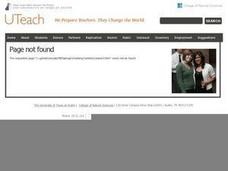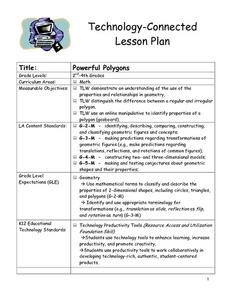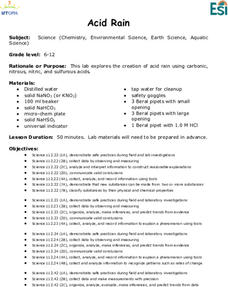Curated OER
Dr. Dirt's Archaeology Lab Artifact Analysis
Students simulate analyzing artifacts in archaeological lab by using real techniques that archaeologists use. Students practice measuring skills, drawing, writing, and brainstorming, and make inferences based on evidence.
Curated OER
Going the Distance
Students experiment in small groups to answer the question, "Is there a relationship between ramps and speed?" They apply a formula to calculate the speed of the cars used in the experiment, complete the associate lab report, and...
Curated OER
Water Pressure Experiments
Students perform experiments measuring water pressure. They record their observations after poking holes in plastic bottles filled with water with the lids on and then off. They discover the role gravity plays in the water flow.
Alabama Learning Exchange (ALEX)
Sonar Mapping of the Ocean Floor
Eighth graders participate in an experiment that emulates a sonar signal bouncing off the ocean floor. They determine how the ocean floor is measured by the length of time it takes for the sonar signal to return. They work with a wooden...
Curated OER
Marine Mammal Diving Reflex
Tenth graders discuss marine mammal diving reflex, and measure pulse rate while holding their breath under three conditions: control, warm water, and ice water to determine if humans exhibit marine mammal diving reflex.
Curated OER
Is Dilution the Solution to Pollution?
Students explore the different types of pollution. they conduct experiments using dye mixed with tap water to measure the levels of dilution. They discuss at what point the dye (pollution) would be diluted enough to be safe to drink.
Curated OER
Understanding Salinity
Middle schoolers discuss why the ocean is salty. They discuss what salinity is. Students are told that is they want to know how much salt is in a body or water, they would use a special scientific tool. They complete an Estuarine Layers...
Curated OER
ECOLOGICAL BIOASSAY OF COPPER SULFATE IN DAPHNIA MAGNA
Students use this lab as a follow up to the introduction of the ecosystems and productivity levels, bioassays and what and how they measure, and Daphnia magna as an index organism, i.e., a species whose health within an ecosystem...
Curated OER
The Art of Protesting
Young scholars view various images to examine different types of protest Americans have used throughout history, and explore ways in which protest can produce change for better or worse.
Curated OER
Powerful Polygons
Students scan the classroom to find different common shapes. They listen as the teacher defines polygon and regular polygon. The teacher demonstrates regular polygons via the Internet and the "Math is Fun" web site. Students go outside...
Curated OER
Change It
Fourth graders expand their knowledge about how the physical properties of a substances can be changed. They are given multiple opportunities, using first-hand experiences and familiar objects in different contexts, to identify...
Curated OER
Acid Rain
Students create acid rain using carbonic, nitrous, nitric, and sulfurous acids.
Curated OER
Is Your Water Clean?
Students compare water quality of different sources. They test water samples for odor, phosphates, pH, bacteria, and dissolved solids. they fill out a data table and answer questions about their findings.
Curated OER
Types of Matter
Learners analyze different types of matter according to its general and specific properties. They design an experiment to classify matter. Students are shown cornflakes and raisins. They are asked what type of substance is each...















